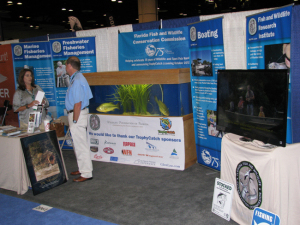Post
ICAST and Uncle Homer’s Legacy
Florida Fishing Articles, Regional Fishing, United States Fishing Articles | Florida theangler PM

It was an ideal venue for Florida Fish and Wildlife Conservation Commission (FWC) staff to highlight the 75th anniversary of the Wildlife and Sport Fish Restoration programs and explain how funds from the sport-fishing part of the program are used to enhance Florida’s recreational fishing and boating industries. Those industries respectively generate economic impacts of $8 billion and $17 billion, and provide nearly 300,000 Floridians with employment. Moreover, Florida’s title of the “Fishing Capital of the World” comes from providing more recreational fishing enjoyment to anglers than any other state, and giving them a lifetime of active nature-based recreation to enhance both their health and mental well-being. The last national survey indicated nearly 50 million days of recreational fishing are enjoyed annually by anglers in the Sunshine State.
The national SFR program, managed by the U.S. Fish and Wildlife Service, collects money from manufacturers of fishing equipment, and motorboat and small-engine fuels. Funds from SFR, combined with fishing license revenues, help support future fishing and boating opportunities, including FWC programs such as habitat enhancement, fish stocking, building boat ramps and artificial reefs and youth fishing programs.
The TrophyCatch program is for anglers who catch-and-release largemouth bass greater than eight pounds. Three different tiers will be recognized: The Lunker Club (8-9.9 pounds), The Trophy Club (10-12.9 pounds) and the Hall-of-Fame Club (13 pounds or more).
Anglers will be encouraged to follow catch-and-release guidelines for bass 8-12.9 pounds and to document the catch with a length, weight and series of photos prior to release. A more thorough certification process will be established regarding Hall-of-Fame bass.
As TrophyCatch is developed and executed it will provide reward incentives to encourage anglers to report and live-release trophy bass, create public/private partnerships to protect trophy bass, promote fishing and support conservation programs. By documenting catches of trophy bass and publicizing them, Florida’s bass fisheries will attain even greater worldwide prominence. By using data on when and where trophy bass are found, biologists can improve trophy-bass management via habitat enhancement, regulation management, stocking or other means that are proven to increase catch of trophy largemouth bass while fostering a strong catch-and-release conservation ethic. Excitement about these angler recognition programs will increase fishing participation of Florida’s youth and families and attract more anglers to Florida while promoting strong conservation messaging. Among the most important outcomes will be to increase public awareness and commitment to protect our fisheries and their habitats.

ICAST is also renowned for its New Product Showcase’s Best of Show Awards. This year, the Hobie Mirage Pro Angler 12 was voted by buyers and media as the Best of Show. You can see winners in all 21 categories at American Sportfishing Association’s ASAfishing.org site.
My favorite award at the ICAST show though is the Professional Outdoor Media Association and ASA Homer Circle Fishing Communicator Award. This award recognizes fishing industry journalists who exemplify the same spirit, dedication to fishing, extraordinary talent and commitment to mentoring the next generation of fishing industry communicators displayed by Homer Circle during his storied career. The 2012 award went to John E. Phillips. Known as Bubba, Phillips was inducted into the National Fresh Water Hall of Fame as a Legendary Communicator.

This year’s presentation was especially meaningful, since it was the first since Homer Circle passed. Homer was born in 1914 and died in June 2012. Even at 97 years of age, he was pursuing his passion and fishing central Florida’s famed bass fisheries just five days before he died.
Between those dates he spent a nearly unimaginable number of hours fishing across America and writing stories revealing his love for and understanding of the piscatorial arts.
Known to anglers and would-be anglers alike as Uncle Homer, his renown as a writer began in 1964 when he started selling his stories to “Sports Afield.” His acumen and prose quickly garnered him the role of angling editor, which he held for 36 years. His column, “Ask Uncle Homer,” in BassMaster Magazine was a classic that many of us came to depend upon.

His career also took him to be a vice president of Hedon lures. According to Ken Duke and Jeff Samsel (“The Bass Fishing Vault,” 2010), his was one of the most monumentally influential bylines in creating the phenomenon that has made black bass the most popular sport fish in the world.
The Fishing Wire (theFishingWire.com) ran an op-ed immediately after Homer’s death that said, “The outdoor industry, especially those who have ever picked up pens or pencils, looked helplessly at a blank sheet of paper in an aging typewriter or stared at a blank screen hoping for writing inspiration, is in mourning after losing a legendary writer, a great friend, and source of inspiration to everyone he met. For decades, Homer Circle has been fishing’s favorite uncle.”
Uncle Homer was also a man of faith who wrote the following prayer, a fitting epitaph for any angler:
The Fisherman’s Prayer
God grant that I may fish
until my dying day;
And when at last I come to rest,
I’ll then humbly pray;
When in His landing net
I lie in final sleep;
That in His mercy I’ll be judged
as good enough to keep!
–Homer Circle
Instant licenses are available at MyFWC.com/License or by calling 888-FISH-FLORIDA (347-4356). Report violators by calling 888-404-3922, *FWC or #FWC on your cell phone, or texting to Tip@MyFWC.com. Visit MyFWC.com/Fishing and select “more news,” or scr.bi/Fish-busters for more Fish Busters’ Bulletins.
